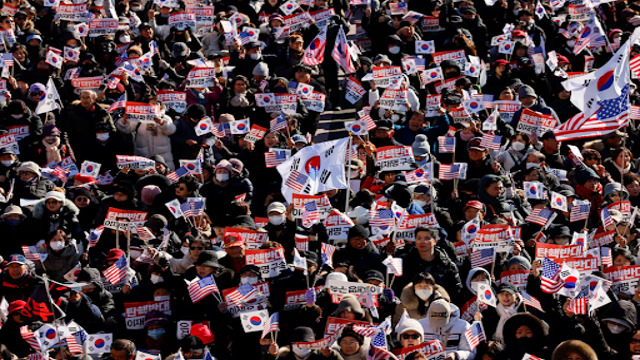
Protesters gathered outside the official residence of impeached South Korean President Yoon Suk Yeol in Seoul on December 31, 2024, voicing their opposition to the court's decision to approve his arrest warrant. Reuters
In an unprecedented turn of events, a South Korean court approved an arrest warrant for President Yoon Suk Yeol on Tuesday. The embattled president, currently impeached and suspended from office, faces serious allegations following his controversial declaration of martial law on December 3. The Corruption Investigation Office for High-ranking Officials (CIO) confirmed the Seoul Western District Court’s decision to grant the arrest warrant, marking a first in the country’s history.
The arrest warrant, valid until January 6, could lead to Yoon’s detention at the Seoul Detention Center. According to investigative authorities, the court issued the warrant due to Yoon’s repeated failure to comply with summons for questioning. He has ignored three requests since the martial law declaration, which was met with widespread condemnation. The court cited concerns that Yoon might continue to evade investigation without legal enforcement.
The allegations against Yoon are grave. Investigators suspect him of leading an insurrection—a charge that strips a sitting president of immunity under South Korean law. While details remain unclear, the court also approved a search warrant for Yoon’s residence, signaling intensified efforts to uncover the truth.
Tensions are high as questions loom over when and how the warrant will be executed. The presidential security service has stated it will follow due process, but past resistance has complicated matters. A prior attempt to search the presidential office was thwarted when security officials blocked investigators from gaining access.
On December 12, 2024, South Korean President Yoon Suk Yeol addressed the nation from the Presidential Office in Seoul. Reuters
The political ramifications of this development are significant. Acting leader of the ruling People Power Party, Kweon Seong-dong, criticized the decision, calling it inappropriate to detain a sitting president. Meanwhile, Kim Yong-min, a prominent opposition lawmaker, urged authorities to act swiftly, stating, “The process of executing the warrant and investigation could be very difficult.”
The impeachment and investigation have left the nation divided. Critics accuse Yoon of overstepping his authority with the martial law declaration, a move many viewed as an attack on democratic values. Supporters, however, argue that the arrest sets a dangerous precedent for prosecuting leaders in office.
The road ahead is fraught with uncertainty. While investigators push to execute the warrants, legal challenges and political pushback are likely to delay proceedings. With national and international attention fixed on this high-stakes case, South Korea finds itself at a pivotal moment in its democratic journey.















